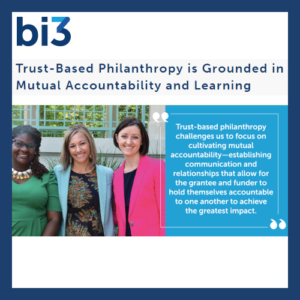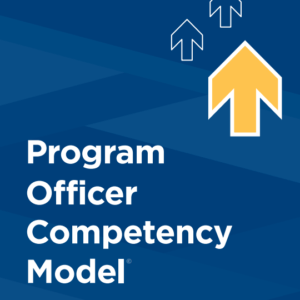Featured Resources
bi3 Article: Trust-Based Philanthropy is Grounded in Mutual Accountability and Learning
A new article shows how applying a trust-based philanthropy lens helps funders capture the full impact of grants, describes how bi3 evaluates initiatives, and how building funder-grantee relationships grounded in power-sharing, transparency, and mutual accountability helps achieve greater impact.
New Competency Model for Foundation Program Officers Released
The Dorothy A. Johnson Center on Philanthropy at Grand Valley State University has released a competency model for foundation program officers.
Taking A cultivate approach to Improve Community Health
Health foundations are increasingly recognizing that their mission is not simply to award grants to deserving nonprofit organizations, but rather to play a catalytic role in improving the conditions that influence health, especially at a population level.
Latest Resources
2012 Terrance Keenan Award Speech
The following remarks are excerpted from Margaret O’Bryon’s acceptance speech upon receiving The Terrance Keenan Leadership Award in Health Philanthropy on March 8, 2012.
Kaiser Permanente
Learn more about the mission, vision, and approach of Kaiser Permanente’s Community Health Initiative in this Grantmaker Focus profile.
The One that Got Away: Emerging Leaders in Health Philanthropy on Moving up and Moving on
Does philanthropy in the 21st century offer a viable career path for rising leaders with fresh visions and several decades of potential contributions before them, or is it a significant, yet temporary stop on what is sure to be a varied career journey?
Robert Wood Johnson Foundation
Learn more about Robert Wood Johnson Foundation’s mission, vision, and approach in this Grantmaker Focus profile.
Public Policy Engagement During an Election Year
Political elections create both challenges and opportunities for foundations seeking to inform and influence the public policy process. Philanthropic organizations have broad latitude to conduct or sponsor a variety of policyrelated activities, and this flexibility includes the ability to promote civic engagement and encourage informed participation in democratic elections.
Grant Agreements and Lobbying
Have you read your grant agreement or grant award
letter recently? Not just scanned it to make sure the
reporting dates have been updated, but read every
paragraph or clause to make sure the agreement says what you
think it says…and what you want it to say? If not, it is time to
do it now.
Guide to Impact Investing (2011)
This guide provides a framework to help funders think strategically about the potential of impact investing, part of a growing practice that incorporates environmental, social, and governance criteria into investment decisionmaking.
Board Service: From in Perpetuity to Term Limits
Twenty-five years ago in 1985, The Health Foundation
of Greater Indianapolis was created with proceeds
from the sale of MetroHealth, one of the first
statewide, staff-model Health Maintenance Organizations
(HMOs). As an independent, not-for-profit grantmaker, the
foundation has been, and is still, dedicated to preserving and
enhancing the physical, mental, and social health of the
Greater Indianapolis community.
Honoring Community Voices to Enhance Health Grantmaking
In philanthropic circles we spend a lot of time discussing the importance of how foundations can meet the needs of and strengthen communities. We expect our grants and program support will prompt change and improve lives, but how often do we end up doing things “to” a community as opposed to working “with” a community to achieve common goals?
Connect With Funder Peers on Governance and Operations
Interested in exchanging strategies, information, and questions with your funder peers? Sign up for GIH E-Forums.



